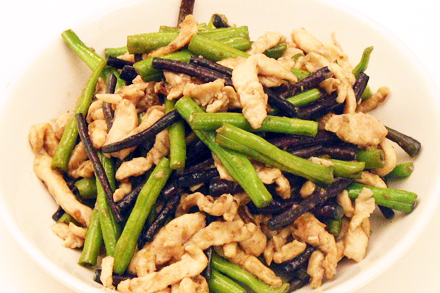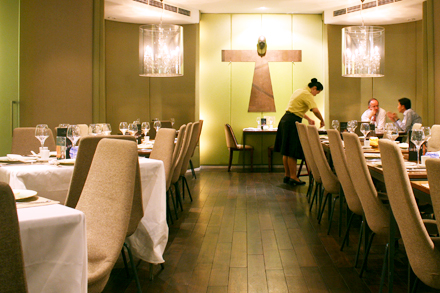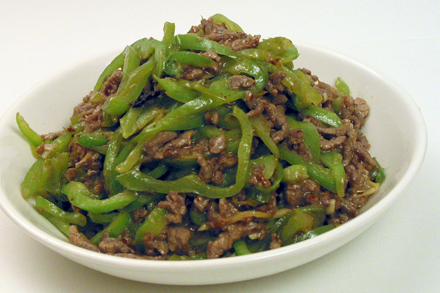
Recently I conducted an email interview with Mitchell Davis, vice president of the James Beard Foundation. The foundation in staging a three day fund raising event in New York including a Gala Dinner and Auction on November 13th, and a two-day culinary conference on November 14th and 15th. Known as Dumplings & Dynasties the event celebrates Chinese cuisine and culture. As promised, here is the full text of the interview.
-
How did the theme of Chinese cuisine come about for this year’s Gala Dinner and Auction? Was the Beijing Olympic a factor in this selection? Or was it the fact that China is very much in the news now a day?
Both the fact that China is very much in the news and also the advent of the Beijing Olympics were factors in our decision to make Chinese cuisine the theme of our gala auction and conference this year. But the main reason is that we felt that amidst all of the interest in China, Chinese cuisine is misunderstood by so many people in the west, even those who love it. We wanted to help create an experience and generate a dialogue that would begin to show the evolution of modern Chinese cuisine both in China and out. So much of what we know in the west about Chinese cuisine has been distorted by cultural and economic influences. We felt it was time to help people understand that Chinese cuisine like every cuisine is a product of tradition, cultural heritage, and modernity.
-
Do you think the fact that China is now more assertive politically has pushed the awareness of her cuisine in the forefront globally?
Actually, I think the reverse may be true. The increased presence of China in world affairs has opened the people up to many western culinary influences. So many chefs from the west, including New York’s own Daniel Boulud and Jean-Georges Vongerichten, have opened restaurants there. And if culturally charged food warnings, such as the one issued by the government not to serve dog while the Olympics were on, become more common, the Chinese will be forced to think reflexively about their cuisine vis-à-vis other cultures’ cuisines—for better and for worse.. I also think China will have to deal with its food safety issues before people will be more open to her culinary influences. Still we have much to learn on both sides of a culinary cultural exchange.
-
Chinese restaurants in America have always had an image of being inexpensive and rather standard and boring. What is your thought on this? What will it take to elevate the cuisine to a higher level?
I agree. And we are hoping that our event will help tip the scale in the other direction. There are so many social issues wrapped up in this phenomenon, from income disparity to racism that I think it will take a lot of work to shift the balance. There are gastronomic issues, too, of the sort that some of the prized ingredients and dishes (abalone, shark’s fin) are not as highly valued by western palates. This means that when Chinese chefs want to up the ante in America, they have to fall back on other things that tend toward the inauthentic. In the past I believe most of the upscale Chinese restaurants in New York were simply serving pricier versions of dishes from cheap Chinese restaurant menus. It has to be possible to find a balance. Of course, there are excellent, authentic upscale Chinese restaurants in North America—Lai Wah Heen in Toronto, which is participating in our event, comes to mind—that manage to attract both upscale Chinese and western clients. But I think we have a long way to go before the average American diner is willing to pay a lot for a Chinese dining experience. Still, I think if it will happen any time, it might be now.
-
There are a few editorials and articles in the New York Time and the Wall Street Journal during the last two years lamenting about the lack of authenticity in Chinese food available in America. Do you agree with them? What do you think is needed to change this? (The references are to two editorials in the New York Times called “Eating Beyond Sichuan” by Nina and Tim Zagat, and “A Rat in the Kitchen” by Fred Ferretti, and an article in the WSJ called “Why Chinese Food Isn’t Hip” by Raymond Sokolov.)
I’m leery of the idea of authenticity when it comes to food of any kind. It’s such a slippery idea that is applied to all sorts of seemingly inauthentic experiences. What could possibly be truly authentic about a French or Italian or Chinese restaurant in New York City? When we are dealing with China, which has such a long tradition of cuisine that is so culturally different from our own, I think it would be impossible to have a totally authentic Chinese restaurant be a success here, and we westerners wouldn’t want it if we could. That said, I realize America is full of restaurants that serve food that no Chinese person would even recognize. The situation is similar to that of Italian food, which has been so bastardized for so long that they are surprised when they go to Italy and they don’t eat deep dish double-stuffed sausage pizza. But I myself have seen friends change their opinion of Chinese food when they try some of the better restaurants. So I think that by improving the quality of Chinese food that is available in general (even in the “inauthentic” places) we can help people better appreciate Chinese food.
-
How did you select the chefs to be represented in this event? I looked over the menu and the dishes are very much new Chinese cooking in style. Do you think they represent a new Chinese culinary movement?
As the tagline of our event suggests, we wanted to show the evolution of modern Chinese cuisine. When we are dealing with immigrant cuisines, we often forget that food evolves after immigrants leave. Our increasingly global world means that chefs from all over are exposed to trends in ingredients and techniques from just about everywhere. We like to think that things shouldn’t change, but they do, and often for the better. Look at the difference between a fancy French restaurant meal from 30 years ago (in France or the U.S.) and the food served in French restaurants today. Rather than try to recreate an old tradition, with thought it would be more interesting to see where Chinese cuisine is today. I think the chefs and the menu will do just that.
The chefs from China were coordinated by Patrick Lin of Metropolitan Hotels, an accomplished Chinese chef in his own right, who traveled several times to China to find chefs who understood our mission and who would have some experience cooking in the west so they could handle the logistic difficulties of cooking in a different type of kitchen with different ingredients. To them we added some of our celebrated North American chefs, to further emphasize the evolution of Chinese cuisine.
-
Why did JBF decide to select the more modern Chinese style rather than the more traditional style?
I’ve sort of answered this above, I think. Mostly we want to show Chinese cuisine as a modern, sophisticated, vibrant, and dynamic world cuisine, not a relic for a museum. I think it is increasingly difficult to find “traditional” cooking in China (as it is “Escoffier” food in France) because things evolve and people’s tastes change.
-
Dumplings and Dynasties also include extensive educational programs in addition to the Gala Dinner and Auction. It this the first time JBF hosted such educational event? If so why were they created?
This is not the first conference on cuisine we have put on. Last year to complement our Italian themed benefit, we organized a conference around the theme of Italy and the Mediterranean Diet. Increasingly the Foundation wants to add educational components to our programs to help people think about the culinary experiences they are having. I think eating itself is an important educational experience, but it is complemented by some good conversation that helps explain the many facets of our culturally complex world of food.
-
What is the goal for these educational programs? Is it to spread knowledge of what is real and authentic Chinese cuisine? Or is it to discuss modern movement in Chinese cooking?
Both and much more. We want people to take more time to think about the food they eat, whether it is Chinese or Italian or sustainably or commercially produced. I think that we have taken food for granted for far too long in America, eating it thoughtlessly, often joylessly. The Beard Foundation, like James Beard himself, wants to encourage people to take food seriously, to think about it, to dissect and understand it, to consider the consequences of our eating decisions, to be discerning, and to do so with the goal of enjoying everything we eat more profoundly.
-
Do you feel there should be an effort to promote understanding of authentic traditional Chinese cooking methods and ingredients? If so do you think JBF has a place in making an impact to encourage this effort? How about encouraging chefs with solid traditional Chinese training to be recognized in America?
Our charge is really America’s cultural heritage and diversity, and so there are a lot of cuisines that fall under our purview. Chinese cuisine happens to be one of the oldest and most elaborated cuisines in the world and I think chefs and diners from everywhere could learn from the traditions and evolution of Chinese cuisine. One of the biggest influences of late on western food has been Japanese cuisine, and I think that Chinese might be next on the horizon.
-
From your contacts with restaurateurs in America where do you think Chinese restaurants are heading? Will Chinese restaurants be able to progress in terms of offering a variety of authentic and modern Chinese coking? Will it be able to convince the American public to accept a more refined dining experience?
I think chefs like Susur Lee (who is coming to New York this fall from Toronto, but who bases his cooking on his upbringing and training in Hong Kong) and David Chang (whose background is Korean, but who uses a lot of Chinese ingredients and techniques) can do a tremendous amount of work in changing the general perception of Chinese cuisine. They have the sort of personalities and charisma to turn everything on their menu into a trend. Those who cling to an old-fashioned idea of authenticity might not approve, but I think we all benefit from seeing the delicious possibilities of food in a different light. I am excited by the prospects and the possibilities, and hope that the James Beard Foundation will be able to say we did our (small) part in opening people’s minds and palates.






What a fascinating interview. Sounds like Dumplings & Dynasties was an amazing event!